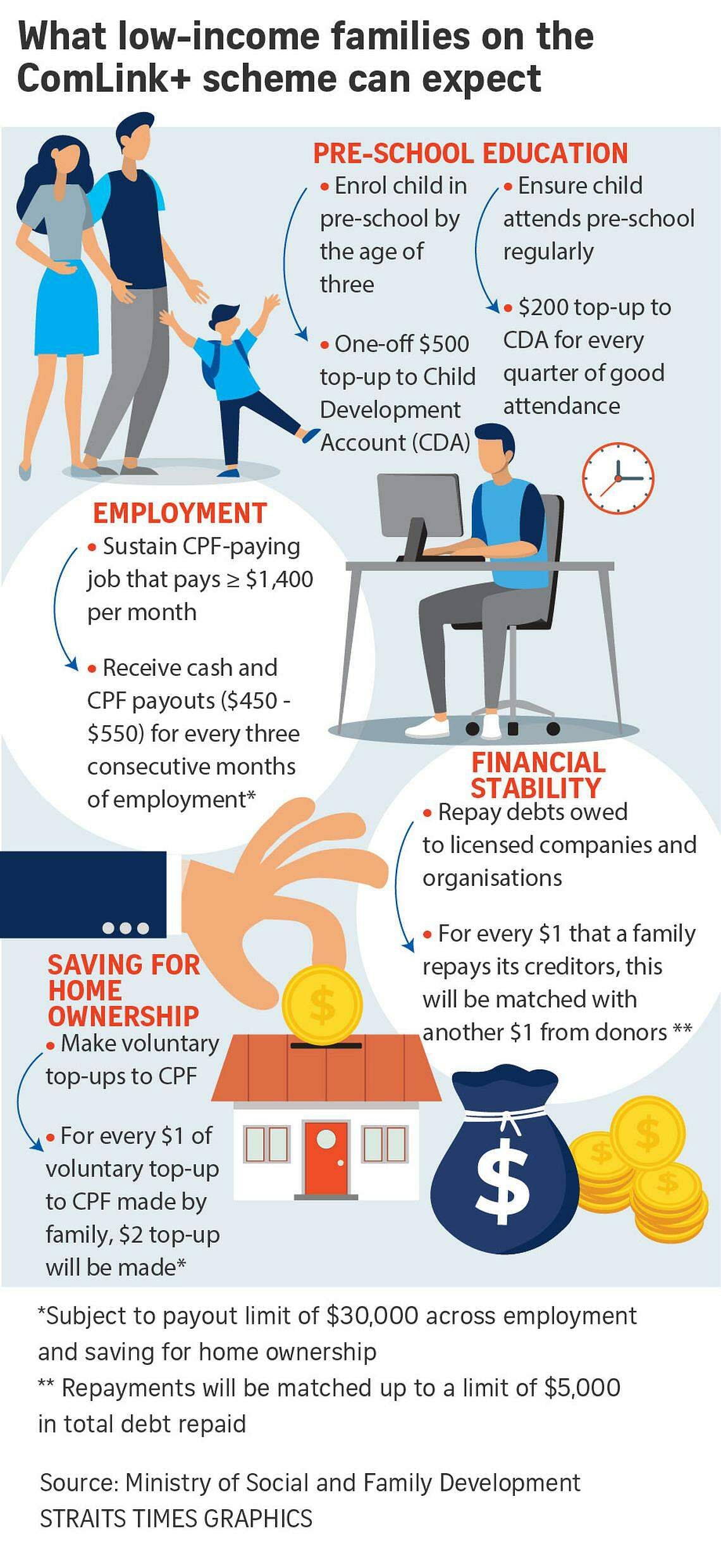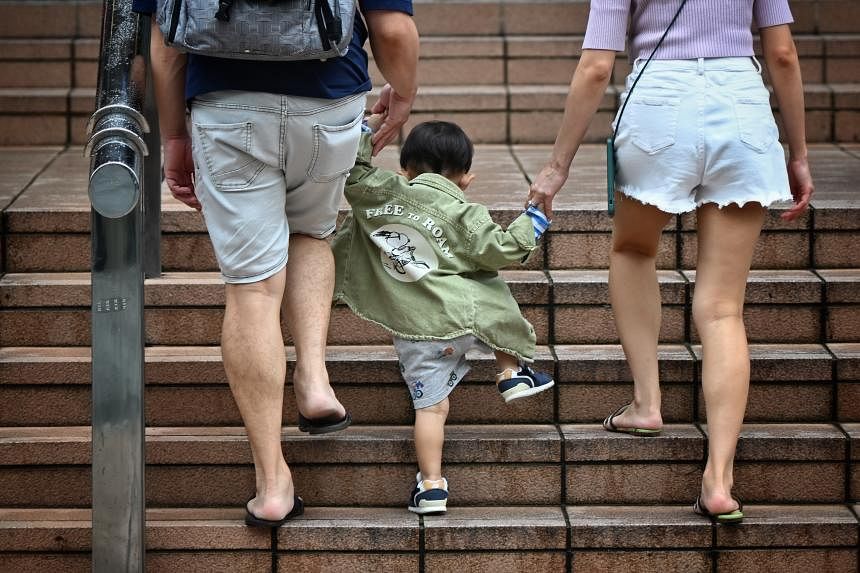SINGAPORE – Imagine this: You are a divorcee with two or three children working in a job that pays a thousand plus dollars a month, and all you have in the bank are a few hundred dollars. Chances are you will be in survival mode.
Topmost on your mind will be putting food on the table, paying the bills and just getting by.
Goals such as owning a flat and finding a job with better prospects – which are norms for middle-class families – may not even cross the minds of people in such situations, said Ms Kelly Low, head of Care Corner Family Service Centre (Tampines).
These goals may also seem out of reach for many low-income families with multiple complex problems, such as illness, unemployment, marital woes, strained family ties and incarceration, say social workers who work with families on the Community Link (ComLink) scheme.
ComLink was started in 2019 to give low-income families with children living in highly subsidised Housing Board rental flats coordinated and comprehensive support ranging from job assistance to children’s development.
On Nov 20, the new ComLink+ scheme, a key plank of the national push to boost social mobility under the Forward Singapore exercise, was unveiled.
The Government is giving financial incentives and other support to ComLink families if they take steps to improve their lives. The support comes in four areas aimed at motivating families to send their children to pre-school by the age of three, get a stable job that pays Central Provident Fund (CPF), and save up to buy their own homes.
For example, each child enrolled in pre-school will get a one-time $500 top-up to the Child Development Account (CDA) when he or she turns three.
And those between the ages of three and six will get a $200 top-up to their CDA every three months if they attend pre-school regularly. The CDA is a special savings account for children that can be used to pay pre-school and healthcare fees.
This is to encourage more low-income families to send their children to pre-school by the age of three, to reduce the risk of their development lagging behind that of their peers when they enter Primary 1. And to help families save up to buy their own flats, for every dollar that the family voluntarily contributes to the CPF Ordinary Account, the Government will top up $2.
In other words, the ComLink+ scheme aims to give these families and their children a fighting chance to escape the poverty trap.
Key push to boost social mobility
With early signs that social stratification is becoming more entrenched, the Government wants to ensure that no family here gets trapped in a permanent underclass, Deputy Prime Minister Lawrence Wong said when he first sketched the broad outlines of ComLink+ in October.
Minister for Social and Family Development Masagos Zulkifli described the ComLink+ scheme as a key shift beyond providing just basic, short-term social assistance to low-income families.
The additional financial support will help ease these families’ financial pressures and help them achieve their longer-term goals faster, he said.
He said on Nov 20: “Rather than quick fixes, we want to enable families to build resilience and secure sustained stability and self-reliance, and ultimately social mobility.
“It may take a generation or more, but we know that by reinforcing families’ ability to provide their children with a good start in life today, we give them a better chance of a brighter tomorrow.”
About 14,000 families on the ComLink scheme are eligible for ComLink+, which will be rolled out from the second half of 2024.
When asked about the average income of families on the ComLink scheme, a spokesman for the Ministry of Social and Family Development (MSF) said the families have to meet all public rental housing criteria. Aside from household income, which was not stated, other factors will also be taken into consideration. These include the families’ circumstances, household size, family support and their ability to afford other housing options.
Social workers say most of the families they work with on the ComLink scheme have a household income of less than $2,000 a month. They are among the poorest families in Singapore.

Family coaches play critical role
Social workers say many low-income families take up jobs in the gig economy such as delivery drivers, instead of full-time jobs, as these give them the flexibility they need for various reasons, such as caregiving. And they get paid immediately, instead of monthly.
Mr Francis Foo, group director of family services at Methodist Welfare Services, said: “Many low-income families live from hand to mouth, making immediate cash of paramount importance to them.”
Under ComLink+, beneficiaries can get between $450 and $550 every three months in a mix of cash and CPF payouts if they find a CPF-paying job with a salary of at least $1,400 a month.
This is where the scheme’s family coaches come in, with social workers noting that such coaches will play a critical role in ensuring the new scheme’s effectiveness.
Ms Low said: “Without these family coaches to spark change, many of these families would be stuck in their day-to-day survival mode. They would find it hard to work towards their goals.”
“If the coach’s stance is one of supporting the families through challenges, that stance alleviates anxiety and spurs hope, thus enabling the families to progress step by step,” added Associate Professor Irene Ng, of the Social Work department at the National University of Singapore (NUS). “If the coach’s stance is one of monitoring compliance to conditions (of the scheme), that adds mental burdens and anxiety, which can discourage progress instead.”
Relieving the debt burden
One unique component of the ComLink+ scheme is the debt clearance package. This package helps to clear sums owed to licensed companies, such as utilities and housing arrears, which can be verified and for which repayments can be tracked.
This package will match dollar for dollar, up to $2,500, the amount the family repays. Families can benefit from this scheme only once, and it does not cover debts to family, friends or loan sharks.
At least two other social service agencies have similar debt clearance programmes.
For example, the MWS runs a programme that matches every dollar of debt repaid by a beneficiary with $2 and this is capped at a certain sum.
Social workers interviewed say some low-income families do not earn enough to make ends meet, and thus accumulate debt in housing, utilities and other bills. Their situation becomes more dire if they experience an illness or other crises.
Such chronic debt creates severe anxiety and affects a person’s ability to think clearly and make good decisions, as one local study, done by Dr Ong Qiyan, Associate Professor Irene Ng and Associate Professor Walter Theseira, has found.
Prof Theseira, an associate professor of economics at the Singapore University of Social Sciences, said helping these families clear their debt gives them a clearer frame of mind, which enables them to better work towards achieving their long-term goals. But the scheme must also help these families take steps to boost their longer-term earnings, he said, or they may end up in debt again.
No free lunch in Singapore
While the new ComLink+ scheme is a major shift in the Government’s approach to giving low-income families a leg-up, Singapore is not turning into a welfare state, said the academics interviewed.
Dr Mathew Mathews, a principal research fellow at the Institute of Policy Studies, pointed out that ComLink+ still emphasises a set of conditions, where beneficiaries are rewarded for certain positive decisions that they make.
This is unlike some welfare models overseas, which provide payments as long as beneficiaries meet certain requirements. The criteria include earning less than a certain income, having a disability or being a caregiver, he said.
Ms Low said: “There is no free lunch in Singapore. The aid given is tied to goals and conditions. The focus is still on taking steps to help oneself.”
And many financial incentives under the ComLink+ scheme are in the form of top-ups to CPF and CDA, instead of cash handouts, noted the academics and social workers.
The ComLink+ support measures will be trialled for three years to assess their effectiveness before any potential scale-up, the MSF said.
And if it takes off, it is my hope that more families beyond those under the ComLink scheme can benefit from it. For there are other low-income families with children, not living in HDB rental flats, who are also facing multiple woes.


